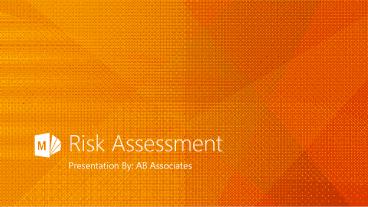Risk Assessment - PowerPoint PPT Presentation
Title:
Risk Assessment
Description:
AB Associates is private risk management and verification agency in Jodhpur with superior quality services and experienced investigators – PowerPoint PPT presentation
Number of Views:106
Title: Risk Assessment
1
Risk Assessment
- Presentation By AB Associates
2
Introduction
- Risk assessment is the determination
of quantitative or qualitative value of risk
related to a concrete situation and a
recognized threat (also called hazard). - Quantitative risk assessment requires
calculations of two components of risk (R), the
magnitude of the potential loss (L), and the
probability (p) that the loss will occur. - Acceptable risk is a risk that is understood and
tolerated usually because the cost or difficulty
of implementing an effective countermeasure for
the associated vulnerability exceeds the
expectation of loss.
3
What is Risk Assessment?
- Risk assessment is the process where you
- Identify hazards.
- Analyze or evaluate the risk associated with that
hazard. - Determine appropriate ways to eliminate or
control the hazard. - In practical terms, a risk assessment is a
thorough look at your workplace to identify those
things, situations, processes, etc. that may
cause harm, particularly to people. After
identification is made, you evaluate how likely
and severe the risk is, and then decide what
measures should be in place to effectively
prevent or control the harm from happening. - For definitions and more information about what
hazards and risks are, please see the OSH Answers
document Hazard and Risk.
4
Why is Risk Assessment important?
- Risk assessments are very important as they form
an integral part of a good occupational health
and safety management plan. They help to - Create awareness of hazards and risks.
- Identify who may be at risk (employees, cleaners,
visitors, contractors, the public, etc). - Determine if existing control measures are
adequate or if more should be done. - Prevent injuries or illnesses when done at the
design or planning stage. - Prioritize hazards and control measures.
5
How do you do a risk assessment?
- Assessments should be done by a competent team of
individuals who have a good working knowledge of
the workplace. Staff should be involved always
include supervisors and workers who work with the
process under review as they are the most
familiar with the operation. - In general, to do an assessment, you should
- Identify hazards.
- Evaluate the likelihood of an injury or illness
occurring, and its severity. - Consider normal operational situations as well as
non-standard events such as shutdowns, power
outages, emergencies, etc. - Review all available health and safety
information about the hazard such as MSDSs,
manufacturers literature, information from
reputable organizations, results of testing, etc
Continue
6
How do you do a risk assessment?
- Identify actions necessary to eliminate or
control the risk. - Monitor and evaluate to confirm the risk is
controlled. - Keep any documentation or records that may be
necessary. Documentation may include detailing
the process used to assess the risk, outlining
any evaluations, or detailing how conclusions
were made. - When doing an assessment, you must take into
account - the methods and procedures used in the
processing, use, handling or storage of the
substance, etc. - the actual and the potential exposure of workers
- the measures and procedures necessary to control
such exposure by means of engineering controls,
work practices, and hygiene practices and
facilities
Continue
7
How do you do a risk assessment?
- By determining the level of risk associated with
the hazard, the employer and the joint health and
safety committee can decide whether a control
program is required. - It is important to remember that the assessment
must take into account not only the current state
of the workplace but any potential situations as
well.
Continue
8
Risk Assessment Process!
- Identify Risk
- Assess Risk
- Communicate Risk
- Mitigate Risk
9
AB Associates
- Thank You
- Want Risk Assessment Services
- Visit http//www.abassociates.co.in































